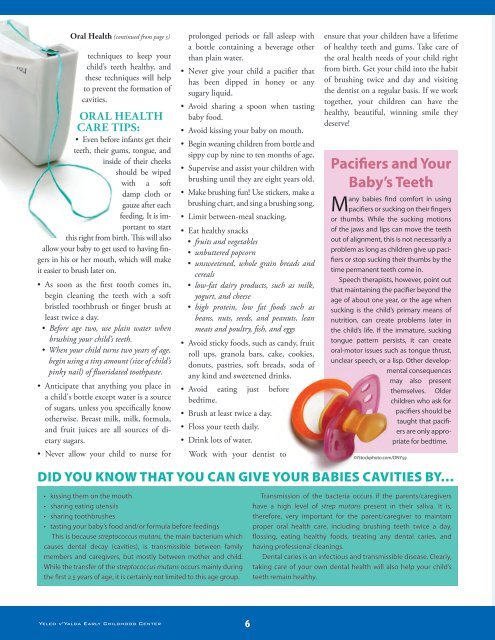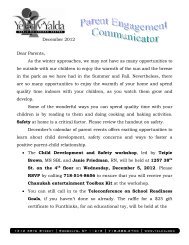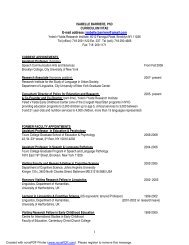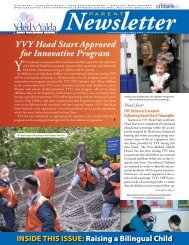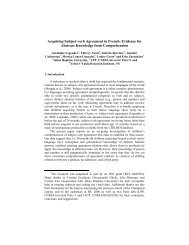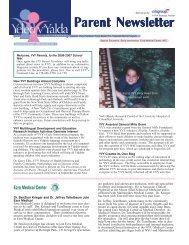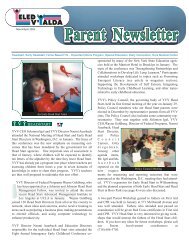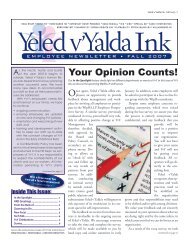May / June 2010 - Yeled.org
May / June 2010 - Yeled.org
May / June 2010 - Yeled.org
You also want an ePaper? Increase the reach of your titles
YUMPU automatically turns print PDFs into web optimized ePapers that Google loves.
Oral Health (continued from page 5)<br />
techniques to keep your<br />
child’s teeth healthy, and<br />
these techniques will help<br />
to prevent the formation of<br />
cavities.<br />
ORAL HEALTH<br />
CARE TIPS:<br />
• Even before infants get their<br />
teeth, their gums, tongue, and<br />
inside of their cheeks<br />
should be wiped<br />
with a soft<br />
damp cloth or<br />
gauze after each<br />
feeding. It is important<br />
to start<br />
this right from birth. This will also<br />
allow your baby to get used to having fingers<br />
in his or her mouth, which will make<br />
it easier to brush later on.<br />
• As soon as the first tooth comes in,<br />
begin cleaning the teeth with a soft<br />
bristled toothbrush or finger brush at<br />
least twice a day.<br />
• Before age two, use plain water when<br />
brushing your child’s teeth.<br />
• When your child turns two years of age,<br />
begin using a tiny amount (size of child’s<br />
pinky nail) of fluoridated toothpaste.<br />
• Anticipate that anything you place in<br />
a child's bottle except water is a source<br />
of sugars, unless you specifically know<br />
otherwise. Breast milk, milk, formula,<br />
and fruit juices are all sources of dietary<br />
sugars.<br />
• Never allow your child to nurse for<br />
prolonged periods or fall asleep with<br />
a bottle containing a beverage other<br />
than plain water.<br />
• Never give your child a pacifier that<br />
has been dipped in honey or any<br />
sugary liquid.<br />
• Avoid sharing a spoon when tasting<br />
baby food.<br />
• Avoid kissing your baby on mouth.<br />
• Begin weaning children from bottle and<br />
sippy cup by nine to ten months of age.<br />
• Supervise and assist your children with<br />
brushing until they are eight years old.<br />
• Make brushing fun! Use stickers, make a<br />
brushing chart, and sing a brushing song.<br />
• Limit between-meal snacking.<br />
• Eat healthy snacks<br />
• fruits and vegetables<br />
• unbuttered popcorn<br />
• unsweetened, whole grain breads and<br />
cereals<br />
• low-fat dairy products, such as milk,<br />
yogurt, and cheese<br />
• high protein, low fat foods such as<br />
beans, nuts, seeds, and peanuts, lean<br />
meats and poultry, fish, and eggs<br />
• Avoid sticky foods, such as candy, fruit<br />
roll ups, granola bars, cake, cookies,<br />
donuts, pastries, soft breads, soda of<br />
any kind and sweetened drinks.<br />
• Avoid eating just before<br />
bedtime.<br />
• Brush at least twice a day.<br />
• Floss your teeth daily.<br />
• Drink lots of water.<br />
Work with your dentist to<br />
ensure that your children have a lifetime<br />
of healthy teeth and gums. Take care of<br />
the oral health needs of your child right<br />
from birth. Get your child into the habit<br />
of brushing twice and day and visiting<br />
the dentist on a regular basis. If we work<br />
together, your children can have the<br />
healthy, beautiful, winning smile they<br />
deserve!<br />
Pacifiers and Your<br />
Baby’s Teeth<br />
Many babies find comfort in using<br />
pacifiers or sucking on their fingers<br />
or thumbs. While the sucking motions<br />
of the jaws and lips can move the teeth<br />
out of alignment, this is not necessarily a<br />
problem as long as children give up pacifiers<br />
or stop sucking their thumbs by the<br />
time permanent teeth come in.<br />
Speech therapists, however, point out<br />
that maintaining the pacifier beyond the<br />
age of about one year, or the age when<br />
sucking is the child’s primary means of<br />
nutrition, can create problems later in<br />
the child’s life. If the immature, sucking<br />
tongue pattern persists, it can create<br />
oral-motor issues such as tongue thrust,<br />
unclear speech, or a lisp. Other developmental<br />
consequences<br />
may also present<br />
©iStockphoto.com/DNY59<br />
themselves. Older<br />
children who ask for<br />
pacifiers should be<br />
taught that pacifiers<br />
are only appropriate<br />
for bedtime.<br />
DID YOU KNOW THAT YOU CAN GIVE YOUR BABIES CAVITIES BY…<br />
• kissing them on the mouth<br />
• sharing eating utensils<br />
• sharing toothbrushes<br />
• tasting your baby’s food and/or formula before feedings<br />
This is because streptococcus mutans, the main bacterium which<br />
causes dental decay (cavities), is transmissible between family<br />
members and caregivers, but mostly between mother and child.<br />
While the transfer of the streptococcus mutans occurs mainly during<br />
the first 2.5 years of age, it is certainly not limited to this age group.<br />
Transmission of the bacteria occurs if the parents/caregivers<br />
have a high level of strep mutans present in their saliva. It is,<br />
therefore, very important for the parent/caregiver to maintain<br />
proper oral health care, including brushing teeth twice a day,<br />
flossing, eating healthy foods, treating any dental caries, and<br />
having professional cleanings.<br />
Dental caries is an infectious and transmissible disease. Clearly,<br />
taking care of your own dental health will also help your child’s<br />
teeth remain healthy.<br />
<strong>Yeled</strong> v’Yalda Early Childhood Center<br />
6


